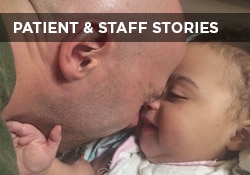This website uses cookies so that we can provide you with the best user experience possible. Cookie information is stored in your browser and performs functions such as recognising you when you return to our website and helping our team to understand which sections of the website you find most interesting and useful.

Susan E. Mazer, Ph.D. Blog
Thoughts and ideas on healthcare
Hi, and welcome to my blog! I'm Susan E. Mazer -- a knowledge expert and thought leader on how the environment of care impacts the patient experience. Topics I write about include safety, satisfaction, hospital noise, nursing, care at the bedside, and much more.
The Invaluable Nature of Patient Stories
October 6, 2017
 I have written about patient stories before. I have even told my own patient story.
I have written about patient stories before. I have even told my own patient story.
And last week, I heard another memorable patient story.
Kristen Terlizzi, the keynote speaker at the Beryl Institute Regional Roundtable in Palo Alto, Calif., provided carefully thought out detail about her a high-risk pregnancy and subsequent rare condition called placenta accreta.
Placenta accreta is the condition of the placenta growing beyond the uterus, sometimes into major organs. The risk of hemorrhage and death is high for both infant and mother.
Kristen told about her initial tests and the dismissal of her concerns by her primary care physician. She told how she called her gynecologist who, again dismissing her worries, finally admitted she hadn’t seen any of her tests.
Then, Kristen finally got to Stanford University Hospital in Palo Alto where her story totally changed.
Taking Things Seriously
At Stanford, the tests were redone, her condition was taken seriously, and Kristen knew that they fully cared about her and what happened to her. She would never again be advised by someone who had not looked at her records, who had no expertise to help her, or who would tell her to just wait and “everything would be fine.”
She spent months in the hospital before and after the birth of her second child. The complexity of Kristen’s case prevented the needed surgery to remove the placenta from her abdomen, including the adjacent organs.
Eventually, the surgery was successfully done, and she healed. However, the trauma that happened regarding Kristen’s relationship with her primary care physician and OB/GYN could have cost her the life of her unborn child as well as her own.
Patient Stories are The Patient Experience
Kristen has told her story many times to the national media, in medical journals, and at conferences. I am sure she will continue to revisit the experience. She is now a Maternal Advocate and Patient Speaker for Stanford University Hospital.
In her advocacy, Kristen does not just list the medical interventions and medications with dates and details. She tells of her thinking, her processing of each small event that led to the diagnosis.
Listening to her story was like a “who dunit,” but with real people, real risks, and real turning points — each one of which could have led to Kristen’s death and that of her infant.
We often use the word “story” to depict fiction or to question the validity of a report of an event. However, to get inside the patient experience, healthcare professionals must hear and see things from the patient’s point of view.
The patient’s story is the real evidence on which to measure and understand the patient experience.
Our Own Story Project
Every day we receive emails or calls from patients, families, and staff who have had a notable experience with The C.A.R.E. Channel while they were in a hospital, clinic, or hospice. Because their stories were poignant and involved so much more than just The C.A.R.E Channel, we sent our production team out in the field to do video interviews, which we have documented in The Story Project.
I encourage you to visit The Story Project on our website. And, think about your own story, we all have one. Then, in your telling and listening, value the lived experience as it is expressed.
Because each person’s story holds many clues about the patient experience.
P.S. If you like this post, please do me a favor and share on LinkedIn, Twitter, Facebook, etc. Also to get automatic notices when a new post is published, please subscribe. No spam – just great content. Thanks!










